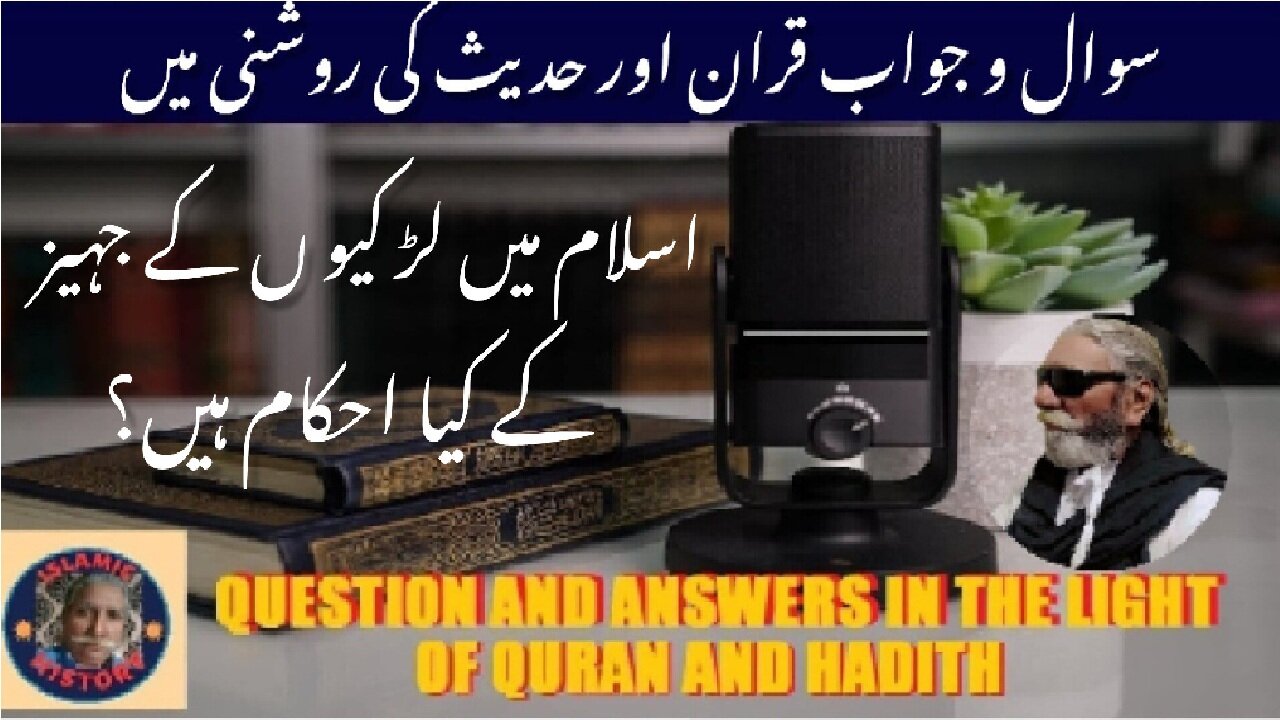Premium Only Content

What is rules of Dowry of the marriage of girls in islam
@islamichistory813 #dowryinislam #marriageinislam #islamicmarriagecustoms #islamicteachingsonmarriage #islamicweddingtraditions
Asslamoalaikum sisters brothers friends and elders, we are discribing about that What is rules of Dowry of the marriage of girls in islam
There are a number of verses in the Qur'an ordaining that the woman's dower belongs to her and not to anybody else, and that for the duration of the marriage too, man should be responsible for defraying the expenses of the maintenance of his wife.
One of the oldest customs in the relationships within the human family is that man has acknowledged the rights of the woman to a dower (mahr) on the occasion of marriage. He used to pay something of value to the woman or to her father. More over, he was responsible, during the whole period of marriage, for the maintenance and upkeep (nafaqah) of his wife and children.
What is the origin of this custom? Why and how did it come into existence? What form does the dower take? Why should the husband pay for the maintenance of the wife? If it is agreed that both the husband and the wife should abide by their natural and human rights, that absolutely just and humane relations should subsist between them, and that man should live with woman entirely in his capacity as a human being, is there any justification for dower and maintenance? Or are dower and maintenance handed down as a remnant from those ages when woman used to be the property of man? Should dower and maintenance be abolished, according to the demands of justice and equality of human rights, especially in the twentieth century, so that marriages take place without the right to dower and maintenance, and should woman bear her own financial requirements, and also share equally in defraying the expenses arising from the children?
We begin our chapter with the topic of the dower. We shall see how the dower came into existence and what its purpose was, and how sociologists have interpreted its coming into existence.
Sociologists say that in prehistoric times human beings led a savage life, lived in tribal groups, and that, for unknown reasons, marriage among blood relations used to be considered taboo. The young men of the tribe who wished to marry were obliged to make the selection of their spouses and lovers from other tribes and for that purpose they had to approach the other tribes to make this choice. In those ages man was not aware of the part he played in the birth of a child. In other words, he did not know that his intercourse with a woman was effective in bringing about the birth of a child. He considered children to be the children of his wife and not his own. Despite the fact that he could see the likeness of his features in the children, he could not understand the reason for that likeness.
Consequently, men used to consider children, as well as themselves, the children of women. The lineage was constructed by reference to mothers, and not by reference to fathers. Men were considered barren and unproductive and after marriage they lived in the tribe of the woman like parasites, and the woman needed him only for his company and his physical strength. This period according to sociologists, is known as the matriarchal period.
It was not long before man came to know of his part in the birth of children and identified himself as the real person to whom his children were to be attributed. From that time on, he brought woman under his control, and took the position of the head of the family; the patriarchal period, as it is called, began.
In that age, too, marriage between blood relations was not considered admissible, and man was obliged to select his spouse from some other tribe and bring her to his own tribe. As there was always a state of conflict and hostility among tribes, the selection of spouse
was by means of abduction, in other words, a young man abducted the girl of his choice from another tribe.
Anyway In Islam, there is no maximum limit on giving a marriage dowry. However, Islam only orders women not to burden the prospective husband with a dowry. the Prophet, SWA said: "The woman who has the greatest blessing is the one with the lightest dowry."
Although Fatima's dowry was modest, because of the Messenger's wish to set an example for the Muslims, and for other implicit reasons, Fatima az-Zahra (sa) did not ignore her greatness and exalted identity to obtain a fantastic gift for her wedding. Fatima’s (sa) drive for excellence, and perfection motivated her to ask for the right of intercession. If Allah willed for the sinners among the Muslims.
Ahmad Ibn Yusuf Ad-Dimashqi in his book Akhbar al-Doual Wa Ath-tha al-Uwal reported the following:
"It was narrated that when she (Fatima) learnt about her marriage and that her dowry was a small number of dirhams, she said:
`O Messenger of Allah, lay girls take money for dowries; what is the difference between me and them (if my dowry was to be money too)? I kindly ask you to give it back and supplicate to Allah, the Exalted, to make my dowry the right to intercede for the sinners among Muslims (on the Day of Rising).' It was then that Gabriel descended with a label on which the following statement was written:
'Allah ordained Fatima Zahra's dowry to be intercession for the sinners among Muslims.'
When Fatima (sa) was on her deathbed, she asked that the label be put on her chest under the coffin. Thus, it was done so. Fatima (sa) said:
"When I am raised on the Day of Resurrection, I will present this label with my hand to intercede for the sinners from among my Father's nation."
Tomorow we will be discribed about dowry of Hazrat Fatimah tul Zhrah.
We pray to Allah almighty he give us right way, and give sympathey to inside their heart to those who demanding ununcessary dowry from parents of bride. Ameen sum Ameen Allah hafiz
=====================================================
-
 1:35
1:35
ISLAMIC HISTORY
1 day agoSurah At Taubah Verse No 8 تلاوت َسورة اَلتَّوْبَة اردو اور انگریزی ترجمے کے ساتھ آیت نمبر
51 -
 1:02:25
1:02:25
Timcast
1 hour agoDistrict Judge BLOCKS Trump From ENDING Of Birthright Citizenship
60.2K94 -
 LIVE
LIVE
Sean Unpaved
43 minutes agoBig 12 Heat, Cash & Class, & Country Club Ball
133 watching -
 LIVE
LIVE
Ben Shapiro
1 hour agoEp. 2235 - The SMOKING GUN In The Biden Cover-Up?
1,495 watching -
 LIVE
LIVE
Flyover Conservatives
12 hours agoDR. BRYAN ARDIS: The Back-to-School Vaccine Checklist They Don’t Want You to Question | FOC Show
578 watching -
 LIVE
LIVE
Rebel News
43 minutes ago'Foreigners' stare at pool, Violent far-left protester, Trump defends women's sports | Rebel Roundup
359 watching -
 56:10
56:10
The Rubin Report
2 hours agoBill Nye Discredits Himself with A Laughably Unscientific ‘Solution’ to Extreme Weather
131K71 -
 LIVE
LIVE
LFA TV
17 hours agoLFA TV ALL DAY STREAM - THURSDAY 7/10/25
3,077 watching -
 2:03:15
2:03:15
Benny Johnson
3 hours ago🚨UNEARTHED: Epstein ADMITTED He 'Worked for CIA' as FBI Responds: 'You Will Get The Files...'
89K159 -
 LIVE
LIVE
The Mel K Show
2 hours agoMORNINGS WITH MEL K -7/10/25
1,042 watching